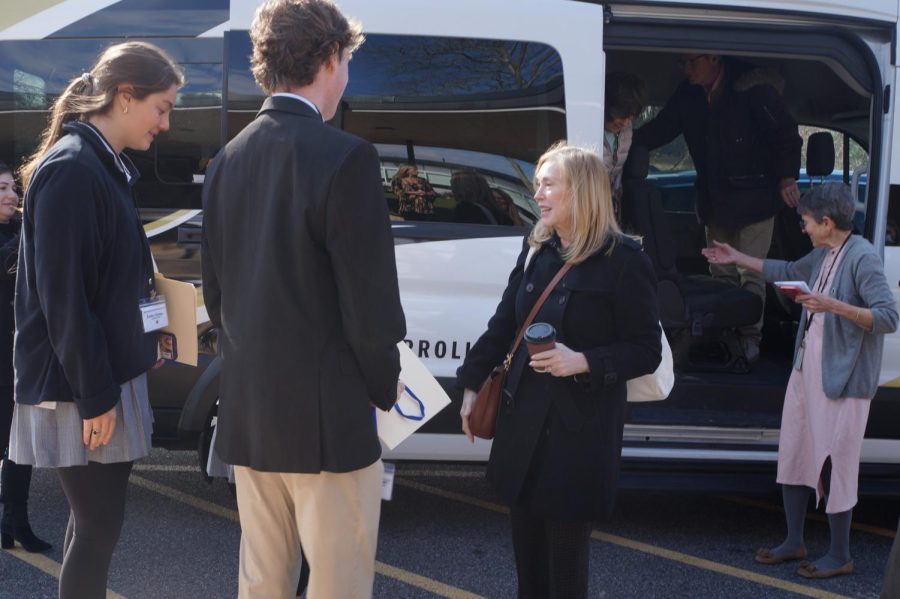Holocaust Education continues for seniors
Holocaust Remembrance Day: March 1, 2023
March 27, 2023
Holocaust Education is an essential part of a John Carroll student’s journey.
“It’s part of our mission. Our mission says graduating students are globally aware and globally responsible students. If you want to be aware and responsible, you have to be aware,” commented Academics Project Coordinator Louise Géczy.
As part of this Holocaust Education, the annual Holocaust Remembrance Day was held for the Class of 2023 on Wednesday, March 1.
Featuring 14 in-person Holocaust survivors, seniors were able to hear first, second, and third generation testimonies. This was the first time since 2019 that in-person survivors were able to attend.
Mrs. Géczy organized the HRD program for the seniors. The goal of this day was to “put a face to history.” She added that she wanted the students to see that the Holocaust included “real people who experienced real things in a variety of different ways.”
The day itself began with introductions from Mrs. Géczy and Vice Principal Jake Hollin.
During his opening remarks, Mr. Hollin said, “The Holocaust did not start with concentration camps and systematic executions; it was an idea, an approach to how we treat others who are different. It was a spoken word or at times an unspoken word. Why we study this is to learn how to be an upstander — not a bystander, to be a pillar — not a pile, to be a creator of good — not a consumer of corruption.”
Reagan McComas performed an original song about listening and acknowledging different perspectives.
A Reader’s Theatre, performed by the Human Rights Class, continued the program before students were given a brief break to prepare for small group sessions.
In the small group sessions, seniors were able to listen to survivors’ stories and to ask them questions about their experiences.
“You can read about things and watch movies; you can study history, but I think it’s a whole lot different if you are face-to-face with an individual who is a living piece of history, whether they experience the Holocaust themselves or is a child of someone who did,” commented Mrs. Géczy.
Holocaust Survivor Herta Baitch said, “This school is so unusual” when referring to how in-depth JC’s Holocaust Education is.
After lunch, JC President Steve DiBiagio shared his father’s American liberator story with the entire senior class. Seniors Chloe Davies and Izzy Cole then performed a dance routine that Chloe had choreographed.
The day ended with a “mock trial” where students in Mrs. Allison Hall’s English classes, in conjunction with two mock trial lawyers, put forgiveness towards Nazis on trial with a real lawyer as an acting judge. The SS soldier from Simon Wiesenthal’s book The Sunflower was put on trial, with the judge ruling in favor of forgiveness.
In this book, a 21-year-old SS soldier on his deathbed speaks to a Jewish man and begs forgiveness for his part in the Holocaust. The soldier recounts how he had become involved in the Hitler Youth and ultimately ended up fighting for Hitler.
Senior Uzair Shaukat was in awe over the courage of the survivors. He said the most important thing he took away was the “strength and the hope the survivors carried throughout all of the injustices placed against them in the Holocaust.”
Mrs. Géczy wants students to see that just because a conflict like a genocide ends, it doesn’t mean that everything is automatically fixed or is automatically good again. People still have struggles. However, even with their struggles, Mrs. Géczy added that she hopes students could see “how much courage it takes to tell a story again and again over one of the most painful experiences you can go through.”
Seniors had been given the chance in their seminar classes to sign up to serve as guides for the survivors. This gave them an opportunity to speak one-on-one and share a meal with them.
Senior Ty Hensley said his experience in serving as a guide was “incredible; it was very powerful hearing how directly the Holocaust impacted people still alive today. It really brings into perspective the scale of the terrible atrocities mankind is capable of.”
Mrs. Géczy is aware that the time for having first-generation survivors is almost over due to their ages, but she hopes to keep having in-person testimony as long as it is possible.
In her closing remarks, Mrs. Géczy said, “We live in a world where if it’s going to function in the best way possible, we have to have that knowledge and that awareness and broaden our horizons and perspectives.”



